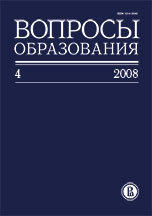Наиболее читаемые статьи этого автора (авторов)
- Дмитрий Попов, Юлия Тюменева, Юлия Кузьмина, Индивидуально-психологические предикторы в лонгитюдных исследованиях образовательных и профессиональных карьер , Вопросы образования / Educational Studies Moscow: № 4 (2010)
- Юлия Кузьмина, Юлия Тюменева, Читательская грамотность 15-летних школьников: значимость семейных, индивидуальных и школьных характеристик , Вопросы образования / Educational Studies Moscow: № 3 (2011)
- Дмитрий Попов, Юлия Тюменева, Галина Ларина, Жизнь после девятого класса: как личные достижения учащихся и ресурсы их семей влияют на жизненные траектории? На материалах лонгитюдного исследования , Вопросы образования / Educational Studies Moscow: № 4 (2013)
- Юлия Тюменева, Татьяна Хавенсон, Характеристики учителей и достижения школьников. Применение метода firstdifference к данным TIMSS-2007 , Вопросы образования / Educational Studies Moscow: № 3 (2012)
- Юлия Тюменева, Анисья Яременко, Руководство для авторов, публикующих результаты разработки оценочного инструмента , Вопросы образования / Educational Studies Moscow: № 1 (2013)
- Дмитрий Попов, Юлия Тюменева, Юлия Кузьмина, Типологизация первокурсников Москвы: кто поступает в столичные вузы? , Вопросы образования / Educational Studies Moscow: № 1 (2013)
- Юлия Тюменева, Юлия Кузьмина, Что дает год обучения российскому школьнику. На материалах PISA-2009: грамотность чтения , Вопросы образования / Educational Studies Moscow: № 1 (2013)
- Юлия Тюменева, Алена Вальдман, Мартин Карной, Что дают предметные знания для умения применять их в новом контексте. Первые результаты сравнительного анализа TIMSS-2011 и PISA-2012 , Вопросы образования / Educational Studies Moscow: № 1 (2014)
- Юлия Тюменева, Анастасия Капуза, Ксения Вергелес, Различительная способность концептуальных карт для оценки уровня компетенции. Пилотное исследование , Вопросы образования / Educational Studies Moscow: № 4 (2017)
- Юлия Тюменева, Ирина Шкляева, Два подхода к пониманию «применения знаний»: трансфер и моделирование. Обзор литературы и критика , Вопросы образования / Educational Studies Moscow: № 3 (2016)








